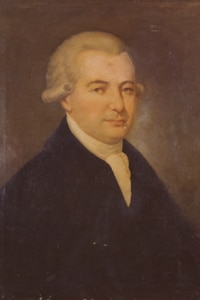George Walton was a signer of the Declaration of Independence and served his country in multiple ways during the American Revolutionary War. His birth date is traditionally held as 1749 or 1750. However, Charles Goodrich, who wrote The Lives of the Signers of the Declaration of Independence, dated his birth in 1740.

He served alongside fellow signers Button Gwinnett and Lyman Hall.
Jump to:
George Walton Facts: Life and work
George Walton was born in Virginia Colony, orphaned as an infant, and raised by his uncle. His uncle was a successful carpenter in Virginia and enlisted Walton as an apprentice. Walton had little interest in carpentry and gravitated towards academics and the study of law.
His uncle actively discouraged him by keeping him close by during the day and refusing him candlelight at night. He believed a boy who did not work with his hands but rather wished to study was lazy.
Walton submitted to his uncle and remained in his apprenticeship until the time was up. During this time, he still continued to study during his free time. Once his apprenticeship ended, George Walton moved to Georgia Colony and began pursuing a career in law. He would be admitted to the bar in 1774.
Walton would prove his uncle wrong and displayed a great work ethic while serving his nation in Georgia. He quickly rose through the political ranks and was elected Secretary of the Georgia Provincial Congress and President of the Council of Safety.
He would then be elected to the Continental Congress and would represent Georgia as one of the Signers of the Declaration of Independence. He then served as a Colonel of the First Regiment of the Georgia Militia.
During his service, he fought in the Battle of Savannah, in which he was captured and then returned after a prisoner exchange.
Upon his return, Walton did not take a vacation, as he was then elected as Governor of Georgia. He would stay governor for 2 months and then take the place of James Jackson in the Senate.
Controversial Actions
Walton was not a corrupt man, but at times allowed his political aspirations to get the better of him. He was a political ally to General Lachlan McIntosh and a political enemy to a fellow signer of the Declaration of Independence, Button Gwinnett.
He and Button had passionate political battles that often resulted in hurt feelings and borderline hatred. These political battles would result in Walton's removal from office and indictment. He also played a role in a duel between Button Gwinnett and General McIntosh.
The duel would leave Button Gwinnett dead, and Walton censured.
Regardless of his controversial actions, Walton never lost the faith of the people.
He served as a Chief Justice of Georgia, Governor of Georgia in 1789, and the United States Senator in 1795.
George Walton Facts: Death
George Walton met his end in Augusta, Georgia, on February 2, 1804. He had suffered from long bouts of gout that had drained his health and energy. He died peacefully and was mourned by his family and friends.

